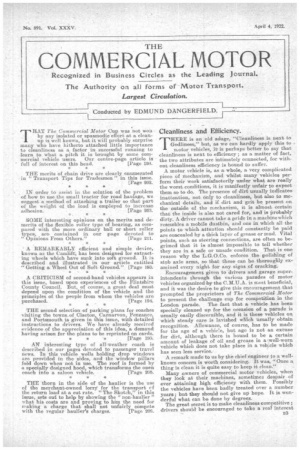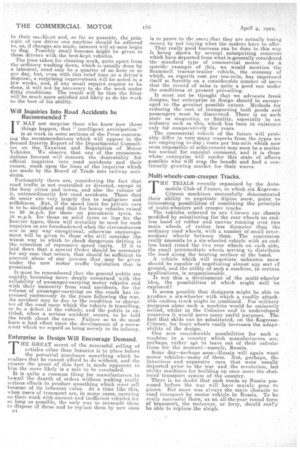Cleanliness and Efficiency.
Page 1

Page 2

If you've noticed an error in this article please click here to report it so we can fix it.
HERE is an old adage, "Cleanliness is next to Godliness," but, as we can hardly apply this to motor vehicles, it-is perhaps better to say that cleanliness is next to efficiency ; as a matter of fact, the two attributes are intimately connected, for without cleanliness efficiency is bound to suffer.
A motor vehicle is, as a whole, a very complicated piece of mechanism, and whilst many vehicles perform their work satisfactorily under what are really the worst conditions, it is manifestly unfair to expect them so to do. The presence of dirt usually indicates inattention, not only to cleanliness, but also to mechanical details, and if dirt and grit be present on the outside of the mechanism, it is almost certain that the inside is also not cared for, and is Probably dirty. A driver cannot take a pride in a machine which resembles a mobile dustbin, and one in which all the points to which attention should constantly be paid are concealed by a thick layer of grease or mud'. Vital paints, such as steering connections, are often so begrimed that it is almost impossible to tell whether they are in a safe or unsafe condition. That is one reason why the L.G.O.Co. enforce the polishing of stub axle arms, so that these can be thoroughly examined every night for any signs of cracking.
Encouragement given to drivers and garage superintendents through the various parades of motor vehicles organized by the C.M.U.A. is most beneficia.1, and it was the desire to give this encouragement that prompted the proprietors of The Commercial Motor to present the challenge cup for competition in the London parade. The fact that a vehicle has been specially cleaned up for the occasion of a parade is usually easily discernible, and it is those vehicles on which steady care is lavished which usually obtain recognition. Allowance, of course, has to be made for the age of a vehicle, but age is not an excuse for dirt, although there is bound to be a certain amount of leakage of oil and grease in a well-worn vehicle which does not take place in a -veh .cle which has seen less service.
A remark made to us by the chief engineer to a wellknown concern is worth considering. It was, "Once a. thing is clean it is quite easy to keep it clean."
Many owners of commercial motor vehicles, when they look at their machines, sometimes despair of ever attaining high efficiency with them. Possibly the vehicles have been badly treated over a number years; but they should not give up hope. It is wonderful what can be done by degrees.
The great secret is to make cleanliness competitive ; drivers should be encouraged to take a real interest n3
in their inaehiees and, so far as possible, the principle of one driver one machine should be adhered to, as, if changes are made, interest will at once begin to flag. Possibly small bonuses might be given to those drivers with the best-kept vehicles.
The time taken felcleaning work, quite apart from the ordinary washing down, which is usually done by a labourer, need only be a quarter of an hour or so per day, but, even with this brief time at a driver's disposal, a surprising improvement will be noted in a few weeks, and, if any small repairi require to be done, it will not be necessary to do the work under filthy conditions. The result will be that the fitter will be much more satisfied and likely to do the work to the best of his ability.
Will Inquiries Into Road Accidents be Recommended ?
IT MAY not .surprise those who know how these things happen, that "intelligent anticipation" is at work in some sections of the Press concerning the recommendations which will appear in the Second Interim Report of the Departmental Committee on the. Taxation and Regulation of Motor Vehicles. . We observe that one of the recommendations forecast will Concern the desirability for official inquiries into road accidents and their causes, much upon the lines of the inquiries which are made by the Board of Trade into railway accidents.
Fortunately there are, considering the fact that road traffic is not controlled or directed, except in the busy cities and towns, and also the volume of it, extraordinarily few road accidents. Those that do occur are very largely due to negligence and selfishness. But, if the speed limit for private cars is to be abolished and that for heavy vehicles raised to 20 m.p.h. for those on pneumatic tyres, to 16 m.p.h. for those on solid tyres or less for the heavier types, there will certainly be need for such inquiries as are foreshadowed when the circumstances are in any way exceptional, otherwise encouragement will be given to those who still consider the wisest way in which to check dangerous driving is the retention of repressive speed limits. If it is laid down that a special Order should be necessary for any case that occurs, that should be sufficient to prevent abuse of any powers that • may be given under the new motor traffic legislation that is promised. . . It must be remembered that the general public are rapidly becoming more deeply concerned with the reliability of passenger-carrying. motor vehicles and with their immunity from road accidents, for the volume of passenger-carrying on the roads has increased enormously in the years following the war. An accident may be due to the condition or character of the road upon which the vehicle is travelling, or to a defect in the vehicle, and the public is entitled, when a serious accident. occurs, to be told the truth about the cause. Failure so to do must have a bad effect upon the development of a movement which we regard as being merely in its infancy.
Enterprise in Design Will Encourage Demand.
THE GREAT secret of the successful selling of articles other than luxuries is to place before the potential purchaser something which he realizes that he cannot afford to do without, and the clearer the proof or this fact is made apparent to him the more likely is a sale to be concluded. ' It is quite a common thing for manufacturers to bewail the dearth of orders without. making really serious efforts to produce something which must sell because of its inherent value. At a time like this, when users of transport are, in many cases, carrying on their work with ancient and inefficient vehicles for iie long as possible, the only way to persuade them to dispose of these and to, replace them by new ones
et
is to prove to the users that they are actually losing money by not buying what the makers have to offer.
That really good business can be done in this way is being shown by several enterprising concerns which have departed from what is generally considered the standard type of commercial motor. As a specific example of this, we would mention the Scammell tractor-trailer vehicle, the economy of which, as regards cost per ton-mile, has impressed itself so forcibly on a considerable number of users that the record of sales is quite a good one under the conditions at present prevailing. It must not be thought that we advocate freak designs, but enterprise in design should be encouraged to the greatest possible extent. Methods for reducing the cost of transporting both goods and passengers must be discovered. There is no such state as stagnation or finality, especially in an industry such as this, which has been in existence only for comparatively few years. The commercial vehicle of the future will probably differ in very Many respects from the types we are employing to-day ; costs per ton-mile which now seem impossible of achievement may. soon be a matter too normal for especial comment, and it is those whose enterprise will render this state of affairs possible who will reap the benefit and find a continually growing market for their wares.
Multi-wheels-cum-creeper Tracks.
HE TRIALS recently organized by the Auto mobile Club of France, in which six Kegresse Citroen machines successfully demonstrated their ability to negotiate Alpine snow, point to interesting possibilities of combining the principle of multi-wheelers and creeper tracks.
The vehicles referred to arc Citroen ear chassis modified by substituting for the rear wheels an endless band of rubber and canvas running over two main wheels of rather less diameter than the ordinary road wheels with a number of small intermediate wheels' between them. The conversion really amounts to a six-wheeled vehicle with an endless band round the two rear wheels on each side, the small intermediate wheels serving to distribute the load along the bearing surface of the band. A vehicle which will negotiate unbeaten snow should be capable of negetiating almost any sort ef ground, and the utility of such a machine, in certain applications, is unquestionable. Is not this a development of the multi-wheeler idea, the possibilities of which might Well be explored? It seems possible that designers might be able to produce a six-wheeler with which a readily attachable endless track might be combined. For military purposes alone such a machine would be eminently suited, whilst in the Colonies and in undeveloped countries it would serve many useful purposes. The fact that skids can be substituted, on the. KegresseCitroen, for front wheels vastly increase's the adapt
ability of the design, •
One .sees considerable possibilities for such • a machine in a country which manufacturers are, perhaps, rather apt to leave out of their calculations for the moment—namely, Russia. ,
Some day—perhaps soon—Russia will again want motor vehicles—many of them_ Not, perhaps, the luxurious and eecpensive cars that were usually imported prior to the war and the revolution, but utility machines for building up once more the shattered transport system of the country.
There is no doubt that such roads as Russia possessed before the war will have mainly gone to pieces. But snow. was always the Main obstacle to road transport by motor vehicle in Russia. To be really successful there, as an all-the-year round form of transport, the motorcar, or lorry, should reaPy be able to replace the sleigh.






























